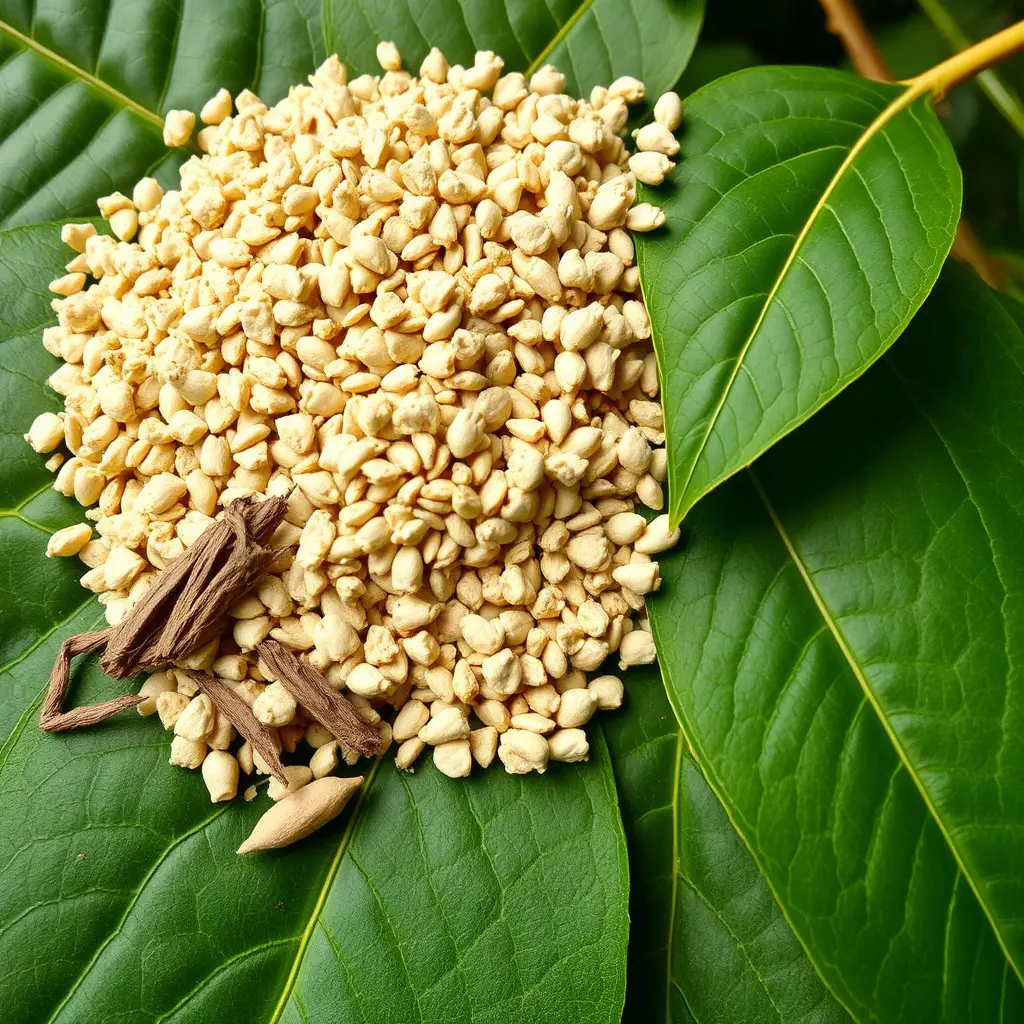Athletes exploring natural supplements for performance enhancement and recovery should be cautious about the use of kratom and blue lotus due to their potential impact on drug tests and legal considerations. Kratom, derived from Mitragyna speciosa leaves, offers pain-relieving and energy-modulating benefits but can trigger positive results for opioids and cannabinoids on drug tests. Similarly, blue lotus smoke, from the Nymphaea caerulea plant, has traditional medicinal uses in relaxation and pain relief but also poses a risk of falsely testing positive for opioids due to its metabolic byproducts. This makes both substances problematic for athletes under anti-doping regulations, such as those enforced by the World Anti-Doping Agency (WADA). To responsibly use these substances while maintaining compliance with drug testing standards and avoiding legal issues, athletes must seek expert advice and be well-informed about their local laws and the implications of their use on performance and competitive standing. It is crucial for athletic organizations to clearly communicate guidelines regarding kratom and blue lotus to prevent unintentional violations by athletes. Understanding the complexities surrounding these substances will enable athletes to make informed decisions that support their recovery without compromising their eligibility or reputation in sports.
Embark on an exploration of athletic recovery enhancement through the integration of kratom coaching. This article delves into the potential benefits of kratom, a mitragynine-rich plant, for alleviating muscle soreness and combatting fatigue post-exercise. Additionally, it examines the often-misunderstood relationship between blue lotus smoke and drug testing in the athletic realm, offering clarity to athletes navigating these complex issues. Unravel the intricacies of optimizing recovery with a focus on kratom’s effects and the legal considerations that come with its use.
- Maximizing Athletic Recovery: The Role of Kratom in Post-Exercise Wellness and Blue Lotus
- Understanding Kratom's Effects on Muscle Soreness and Fatigue Reduction
- Navigating the Legalities: Kratom and Drug Testing for Athletes
Maximizing Athletic Recovery: The Role of Kratom in Post-Exercise Wellness and Blue Lotus

Athletes are constantly seeking methods to enhance their performance and recovery, with a particular focus on post-exercise wellness. Kratom, a botanical alkaloid derived from the leaves of Mitragyna speciosa, has garnered attention for its potential role in optimizing athletic recovery. Kratom is known for its stimulant and sedative properties, which can help in managing pain, reducing fatigue, and promoting relaxation post-workout. When used judiciously, kratom can be a valuable tool in an athlete’s regimen, facilitating the body’s natural recovery processes. However, it is imperative for athletes to navigate this substance with caution, as its effects can vary widely based on dosage and individual physiology.
In addition to kratom, another substance that has piqued interest in the realm of athletic recovery is blue lotus. The blue lotus plant, Nymphaea caerulea, has a history of use in traditional medicine for its calming and pain-relieving effects. When considering drug testing, it’s crucial to understand that blue lotus smoke can potentially lead to a positive result on certain drug tests due to its similarity in metabolic byproducts to those of opioids or cannabinoids. Athletes interested in incorporating blue lotus into their recovery routine should be fully informed about the potential implications on drug testing and seek guidance from a qualified professional, such as a kratom coach who specializes in natural supplements and their interactions with performance enhancement and testing protocols. This due diligence ensures that athletes can safely explore the benefits of these substances without compromising their athletic careers or health.
Understanding Kratom's Effects on Muscle Soreness and Fatigue Reduction

Athletes are constantly seeking methods to enhance performance and accelerate recovery, a crucial aspect of any training regimen. Kratom, derived from the leaves of the Mitragyna speciosa tree, has gained attention in the athletic community for its potential effects on muscle soreness and fatigue reduction. Its active alkaloids, mitraphylline and 7-hydroxymitragynine, are believed to interact with opioid receptors in the body, which may provide relief from pain and discomfort associated with intense physical activity. When incorporating kratom into a recovery protocol, athletes might experience a reduction in muscle soreness, particularly during the acute phase post-exercise. This can be attributed to its analgesic properties, which help in managing the inflammatory response that leads to pain.
Furthermore, kratom’s impact on fatigue is also noteworthy. By potentially stimulating the central nervous system and modulating energy levels, it may aid in the quicker resolution of fatigue, allowing for a more rapid return to training or competition. However, it’s imperative to approach the use of kratom with caution, as it can be subject to drug testing and may have implications for athletes who are tested under regulations such as those by the World Anti-Doping Agency (WADA). Blue Lotus, a company specializing in herbal products, offers smokeable forms of kratom that must be used responsibly and with an understanding of their legal status and potential effects on drug tests. Athletes should consult with healthcare professionals and adhere to the guidelines set forth by governing bodies to ensure they are not inadvertently violating anti-doping policies.
Navigating the Legalities: Kratom and Drug Testing for Athletes

When athletes seek to incorporate kratom into their recovery regimen, understanding the complex legal landscape surrounding its use is paramount. Kratom, a plant from Southeast Asia whose leaves can be consumed as a tea or powder, has gained attention in athletic communities for its potential analgesic and energizing properties. However, its legal status varies by jurisdiction, with some regions classifying it as a controlled substance due to its opioid-like effects. Athletes must therefore be vigilant about the laws governing kratom in their respective sports leagues or organizations, as its legality can influence eligibility and compliance with anti-doping regulations.
Navigating drug testing policies is another critical aspect for athletes integrating kratom into their wellness routine. Standard drug tests, including those used by professional athletic organizations like the NCAA, NFL, MLB, NHL, and UFC, typically screen for a wide range of substances, including opioids. Given that kratom’s chemical compounds can trigger positive results for opiates on such tests, athletes must be aware that its use could lead to disciplinary action, despite the substance not being a synthetic or illicit opioid. To avoid unintentional violations, athletes should consult with certified kratom coaches or sports nutritionists who are well-versed in the nuances of drug testing and kratom’s implications for performance enhancement and recovery. Additionally, they should advocate for clear guidelines from their governing bodies to ensure that any decisions regarding kratom use are made with full knowledge of the potential consequences. Understanding the interplay between kratom usage, legal frameworks, and anti-doping regulations is essential for athletes looking to optimize their recovery without risking their competitive status or reputation.
Incorporating kratom coaching into athletic training regimens presents a promising avenue for optimizing recovery, as detailed in our exploration of maximizing athletic recovery, understanding its effects on muscle soreness and fatigue reduction, and navigating the complex legalities surrounding drug testing for athletes. The traditional herbal supplement, blue lotus, often associated with kratom, also plays a significant role in this context, offering a natural alternative that aligns with the wellness needs of athletes seeking to enhance their performance and recovery without the risk of failing a drug test. It is clear that with careful consideration and adherence to legal guidelines, kratom can be a valuable tool for those looking to improve their athletic recovery process. Athletes considering kratom as part of their recovery strategy should consult with healthcare professionals and stay informed about the evolving regulatory landscape. By doing so, they can harness the benefits of kratom while maintaining their eligibility for competition.






